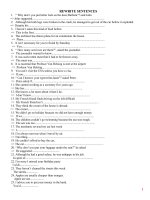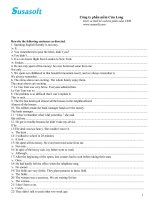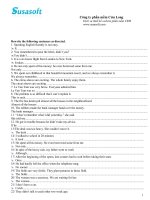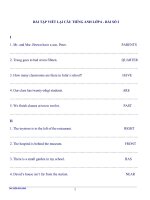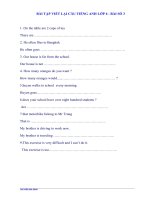BÀI TẬP VIẾT LẠI CÂU TIẾNG ANH ÔN THI VÀO 10 ÔN THI HSG (CÓ ĐÁP ÁN) PART II
Bạn đang xem bản rút gọn của tài liệu. Xem và tải ngay bản đầy đủ của tài liệu tại đây (85.85 KB, 8 trang )
BÀI TẬP VIẾT LẠI CÂU CÓ ĐÁP ÁN
Viết lại câu sao cho nghĩa không đổi, không thay đổi dạng của từ cho sẵn.
Exercise 1:
1. I suffered from obsessive and agonising thoughts. Prey
………………………………………………………………………………………………
2. He can hardly read at all. Virtually
………………………………………………………………………………………………
3. He can speak French well enough to go to the conference. Fluent
………………………………………………………………………………………………
4. His arrival was completely unexpected. Took
………………………………………………………………………………………………
5. The first sign of the disease is a feeling of faintness. Onset
………………………………………………………………………………………………
6. He began by giving us a summary of his progress so far. Outset
………………………………………………………………………………………………
7. As an antidote to their disappointment, he bought them ise-cream. Offset
………………………………………………………………………………………………
8. I travel by bus only when I have no alternative. Resort
………………………………………………………………………………………………
Exercise 2:
1. Sarah wore dark glasses so that no one would recognise her. Avoid
………………………………………………………………………………………………
2. Anne was afraid the neighbours would despire her for not having a washing machine.
Look
…………………………………………………………………………………………
3. If only you had tried harder you might have passed the exam. Effort
………………………………………………………………………………………………
4. ‘I wonder if you could possibly open the door for me?’mind
………………………………………………………………………………………………
5. It might be better if that paragraph was omitted. Leave
………………………………………………………………………………………………
6. Bill reckoned that his success was due to incredible luck. Put
………………………………………………………………………………………………
7. Why not tell him the truth and be finished with it? Get
………………………………………………………………………………………………
8. Martin had difficulty in accepting the loss of his money. Hard
………………………………………………………………………………………………
9. It wasn’t my intention to upset you. Mean
………………………………………………………………………………………………
10. The children pestered ur for sweets. Kept
………………………………………………………………………………………………
Exercise 3:
1. They don’t mind which film they go to. Matter
………………………………………………………………………………………………
2. He continued his story, even though no one was listening. Went
………………………………………………………………………………………………
3. If I were left alone, I’d finish the job quickly. Interrupting
………………………………………………………………………………………………
4. The notice said that you could not smoke in class. Forbidden
………………………………………………………………………………………………
5. My mother did not like my new shoes. Disapproved
………………………………………………………………………………………………
6. She was dismissed because her typing was poor. Lost
………………………………………………………………………………………………
7. He spoke confidently and that impressed me. Which
………………………………………………………………………………………………
8. She doesn’t know the difference between margarine and butter. Tell
………………………………………………………………………………………………
9. He is famous for his vast knowledge of primitive religion. Authority
………………………………………………………………………………………………
10. He took no part in the discussion. Contribute
………………………………………………………………………………………………
Exercise 4:
1. How do you explain the difference between the two witnesses’ stories? Account
………………………………………………………………………………………………
2. He is certainly not stupid. Means
………………………………………………………………………………………………
3. ‘You don’t appreciate me,’ she complained. Granted
………………………………………………………………………………………………
4. After the death of the giant they lived in peace. Once
………………………………………………………………………………………………
5. The man in that painting bears a strong resemblance to my uncle. Reminds
………………………………………………………………………………………………
6. Someone has stolen her bicycle. Had
………………………………………………………………………………………………
7. People know they were spies. Known
………………………………………………………………………………………………
8. I found it when I was looking through some old papers. Came
………………………………………………………………………………………………
9. We didn’t go in case we were recognised. Fear
………………………………………………………………………………………………
10. After two hours the bridegroom still hadn’t appeared. Sign
………………………………………………………………………………………………
Exercise 5:
1. We could just discern the buildings through the fog. Make
……………………………………………………………………………………………
2. It is my strong belief that John was responsible. Suspect
……………………………………………………………………………………………
3. He has a good relationship with all his students. Gets
………………………………………………………………………………………………
4. His rude behaviour is too much for me. Put
……………………………………………………………………………………………
5. The meeting was well attended. Turned
……………………………………………………………………………………………
6. It was obvious that the old house was past its prime. Days
……………………………………………………………………………………………
7. As a boy, he was a ragular churchgoer. Used
……………………………………………………………………………………………
8. How likely is it she will pass the exam? Chances
……………………………………………………………………………………………
9. The film didn’t come up to my expectations. Short
……………………………………………………………………………………………
10. I can’t stand that dreadful noise any longer. Enough
……………………………………………………………………………………………
ĐÁP ÁN
Exercise 1:
1. I was a prey to obsessive and agonising thoughts.
2. He is virtually unable to read.
3. His French is fluent enough to go to the conference.
4. His arrival took us by surprise.
5. The onset of the disease is shown by a feeling of faintness.
6. At the outset, he gave us a summary of his progress so far.
7. To offset their appointment, he bought them ice-cream.
8. I resort to travelling by bus only when I have no alternative.
Exercise 2:
1. Sarah wore dark glasses to avoid being recognised.
2. Anne was afraid the neighbours would look down on her for not having a washing
machine.
3. If only you had made an effort you might have passed the exam.
4. Would you mind opening the door for me?
5. It might be better to leave out that paragraph.
6. Bill put his success down to incredible luck.
7. Why not tell him the truth and get it over with?
8. Martin found it hard to accept the loss of his money.
9. I didn’t mean to upset you.
10. The children kept on asking us for sweets.
Exercise 3:
1. It doesn’t matter to them which film they go to.
2. He went on with his story even though no one was listening.
3. If you didn’t keep interrrupting I’d finish the job quickly.
4. The notice said that smoking in class was forbidden.
5. My mother disapproved of my new shoes.
6. She lost her job because her typing was poor.
7. The confident way in which he spoke impressed me.
8. She can’t tell margarine from butter.
9. He is an authority on primitive religion.
10. He didn’t contribute to the discussion.
Exercise 4:
1. How do you account for the difference between the two witnesses’story?
2. He is by no means stupid.
3. ‘You take me for granted,’ she complained.
4. Once the giant died they lived in peace.
5, The man in that painting reminds me very much of my uncle.
6. She has had her bicycle stolen.
7. They were known to be spies.
8. I came across it when I was looking through some old papers.
9. We didn’t go for fear of being recognised.
10. After two hours there was still no sign of the bridegroom.
Exercise 5:
1. We could just make out the buildings through the fog.
2. I strongly suspect that John was responsible.
3. He gets on well with all his students.
4. I can’t put up with his rude behaviour.
5. A lot of people turned up for the meeting.
6. The old house had seen better days.
7. As a boy, he used to go to church regularly.
8. What are her chances of passing the exam?
9. The film fell short of my expectations.
10. I have had enough of that dreadful noise.



